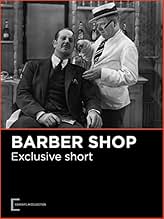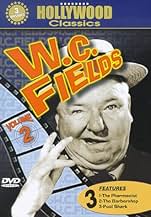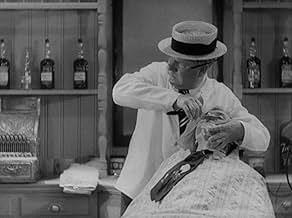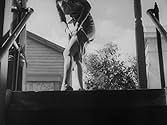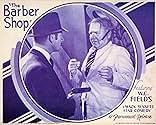Füge eine Handlung in deiner Sprache hinzuAn inept barber maintains his good-humored optimism in his small town shop despite having a hen-pecking harridan for a wife and a total lack of tonsorial skill.An inept barber maintains his good-humored optimism in his small town shop despite having a hen-pecking harridan for a wife and a total lack of tonsorial skill.An inept barber maintains his good-humored optimism in his small town shop despite having a hen-pecking harridan for a wife and a total lack of tonsorial skill.
John Sinclair
- Mr. Flugg
- (as John St. Clair)
Frank Alexander
- Steam Room Victim - Before
- (Nicht genannt)
Billy Bletcher
- Steam Room Victim - After
- (Nicht genannt)
Joe Bordeaux
- Passerby
- (Nicht genannt)
Harry Bowen
- Cop
- (Nicht genannt)
Joe Calder
- Passerby
- (Nicht genannt)
Julia Griffith
- Mrs. Scroggins - Passerby
- (Nicht genannt)
Fay Holderness
- Little Girl's Mother
- (Nicht genannt)
George Humbert
- Jose
- (Nicht genannt)
William McCall
- Man with Horse
- (Nicht genannt)
Gloria Velarde
- Gloria - Little Girl in Barber's Chair
- (Nicht genannt)
Frank Yaconelli
- Italian Man Selling Bass Fiddle
- (Nicht genannt)
Empfohlene Bewertungen
THE BARBER SHOP (Paramount, 1933), directed by Arthur Ripley, marks the fourth and final Mack Sennett Star Comedy short to feature W.C. Fields (who also scripted), following THE DENTIST (1932), THE FATAL GLASS OF BEER (1933) and THE PHARMACIST (1933). Not quite as famous as the initial two, THE BARBER SHOP does bear a strong resemblance to THE PHARMACIST, that of Fields wearing a straw hat with an open top; his encounter with a bank robber; and having Elsie Cavanna (famous as the drill patient in THE DENTIST) in the role of his wife. As with THE DENTIST, however, the customers in THE BARBER SHOP are more victims than patrons. For Fields' final short (lasting 21 minutes), much of it falls into familiar territory in true Fields-comedic style, with touches of originality, especially his chosen character name, pun intended.
Set in Felton City, "Population 873, Elevation two feet below sea level," the story revolves around the day in the life of Cornelius O'Hare (W.C. Fields), a small town barber with a nagging wife (Elsie Cavanna) and a young son, Ronald (Harry Watson). O'Hare's morning starts off peacefully as he sits in front of his place of business (with his home in back of the barber shop), greeting the passing residents while sharpening his razor, then playing his huge bass fiddle he names "Lena." After dining at the breakfast table with his family, O'Hare's work day, shared by his manicurist (Dagmar Oakland), soon comes to a series of mishaps as he shaves off a mole from a man's chin, places an ultra hot towel over that same customer's (John St. Clair) face by holding a pair of tongs, and unwittingly locking a fat man ("Fatty" Alexander) in a steam room before O'Hare's day is complete as he finds himself face to face with an armed bank robber (Cyril Ring).
With Fields being best known playing one with a strong dislike for children and animals, THE BARBER SHOP shows his compassion towards his offspring, listening attentively listening to his riddles, rather than being short-tempered towards his annoyance. In fact, there's even a brief scene where he happily throws a ball over to the neighborhood street kids, only to have it landing on top of a man's noggin. So not to be a total loss, the plot does include Fields' encounter with a baby in a stroller hitting him over the head with a milk bottle, as well as his involvement with Mrs. Broadbottom's (Fay Holderness) bratty daughter, Gloria, wearing an assortment of party hats. A dog takes part sitting by the barber's chair awaiting for another chance for O'Hare to accidentally cut off an ear while shaving a customer, but all the dog can do is witness some "close shaves."
Although the brief climatic chase and its closing fail to recapture some rather amusing scenes earlier in the story, THE BARBER SHOP does recapture classic routines originated on stage by Fields himself, some for which he reprized to better advantage in his later feature film comedies. With Alison Skipworth and Kathleen Howard making the grade as Fields' most notable co-stars during his years (1932-38) at Paramount, Elsie Cavanna shouldn't go unnoticed with her participation in three of Fields four comedy shorts, with THE DENTIST as their most famous and revived.
THE BARBER SHOP, along with other Fields' shorts, has turned up occasionally on television over the years, notably cable stations (American Movie Classics in the 1990s, and Turner Classic Movies a decade later), and distribution on video and DVD formats, with best possible prints from the Criterion Collection. For some amusements, watch Cornelius O'Hare's barber shop methods. For a good haircut and a shave, try someplace else. (***)
Set in Felton City, "Population 873, Elevation two feet below sea level," the story revolves around the day in the life of Cornelius O'Hare (W.C. Fields), a small town barber with a nagging wife (Elsie Cavanna) and a young son, Ronald (Harry Watson). O'Hare's morning starts off peacefully as he sits in front of his place of business (with his home in back of the barber shop), greeting the passing residents while sharpening his razor, then playing his huge bass fiddle he names "Lena." After dining at the breakfast table with his family, O'Hare's work day, shared by his manicurist (Dagmar Oakland), soon comes to a series of mishaps as he shaves off a mole from a man's chin, places an ultra hot towel over that same customer's (John St. Clair) face by holding a pair of tongs, and unwittingly locking a fat man ("Fatty" Alexander) in a steam room before O'Hare's day is complete as he finds himself face to face with an armed bank robber (Cyril Ring).
With Fields being best known playing one with a strong dislike for children and animals, THE BARBER SHOP shows his compassion towards his offspring, listening attentively listening to his riddles, rather than being short-tempered towards his annoyance. In fact, there's even a brief scene where he happily throws a ball over to the neighborhood street kids, only to have it landing on top of a man's noggin. So not to be a total loss, the plot does include Fields' encounter with a baby in a stroller hitting him over the head with a milk bottle, as well as his involvement with Mrs. Broadbottom's (Fay Holderness) bratty daughter, Gloria, wearing an assortment of party hats. A dog takes part sitting by the barber's chair awaiting for another chance for O'Hare to accidentally cut off an ear while shaving a customer, but all the dog can do is witness some "close shaves."
Although the brief climatic chase and its closing fail to recapture some rather amusing scenes earlier in the story, THE BARBER SHOP does recapture classic routines originated on stage by Fields himself, some for which he reprized to better advantage in his later feature film comedies. With Alison Skipworth and Kathleen Howard making the grade as Fields' most notable co-stars during his years (1932-38) at Paramount, Elsie Cavanna shouldn't go unnoticed with her participation in three of Fields four comedy shorts, with THE DENTIST as their most famous and revived.
THE BARBER SHOP, along with other Fields' shorts, has turned up occasionally on television over the years, notably cable stations (American Movie Classics in the 1990s, and Turner Classic Movies a decade later), and distribution on video and DVD formats, with best possible prints from the Criterion Collection. For some amusements, watch Cornelius O'Hare's barber shop methods. For a good haircut and a shave, try someplace else. (***)
W. C. Fields had done a few silent shorts in the "teens" but it really did take sound to capture him at his best. He is not only a physical comedian, capable of broad slapstick, he is one of the best verbal comedians around, especially when allowed to ad-lib, as he does here. The story follows the adventures of barber Cornelius O'Hare through his extremely busy day. It has the look of a vaudeville routine, which no doubt it was based on. Fields' almost constant patter makes all his movies worth rewatching, just to catch his subtle remarks, often made under his breath and very quickly. I have read that, at the beginning of the short, as Fields is sitting out front of his shop, making rude comnents about people as they go by, that this is a tribute to his mother, who acted just like this as Fields was a boy, commenting cuttingly on the neighbors. If you like sardonic humor, Fields is the man for you. Recommended highly along with any of his other shorts as in these shorter films, much more is packed in and nothing is allowed to lag.
Another dose of madness from W. C. Fields, this short sees him playing the part of Cornelius O'Hare, small-town barber with a cutting observation for all who pass his path. Fields comes up with a number of gags that possibly only he would dream up, whether its testing the sharpness of a razor on his tongue, playing a bass fiddle in his own inimitable way, or shaving a hapless customer with all the delicacy of a blind man painting a barn door. This forms a loose trio with The Dentist and The Pharmacist, which Fields also made for Mack Sennett, and all of which present the comedian at the height of his talent although this one is perhaps the weaker of the three.
With the great W.C. Fields in fine form, and a setup that provides him with a lot of good material, "The Barber Shop" is a very enjoyable short comedy. It is filled with the kinds of details and subtle gags that make Fields's comedies worth watching attentively.
"The Barber Shop" closely resembles the Fields feature "The Pharmacist", with very similar settings and stories. Both are very good, and in both of them Elise Cavanna is funny as the domineering wife of Fields's character. Both have some gags that are deliberately absurd, and others that are less obvious. Both feature amusing exchanges between Fields and numerous customers.
When Fields was at his best, he could really get across the wackiness of so much of what happens in daily life, and that's one of the things that works quite well here.
"The Barber Shop" closely resembles the Fields feature "The Pharmacist", with very similar settings and stories. Both are very good, and in both of them Elise Cavanna is funny as the domineering wife of Fields's character. Both have some gags that are deliberately absurd, and others that are less obvious. Both feature amusing exchanges between Fields and numerous customers.
When Fields was at his best, he could really get across the wackiness of so much of what happens in daily life, and that's one of the things that works quite well here.
Although he usually gets high marks for being funny, W.C. Fields seldom gets credit for versatility. Even people familiar with his work tend to define his screen persona narrowly as a cantankerous, lecherous old blow-hard who hates kids and dogs, and is usually drunk. This image was firmly ingrained in the public imagination during the late 1930's and '40s through his radio work and most of his later movie appearances, but a look back at the films he made in the early to mid-'30s reveals distinct variations in his roles. He was capable of a surprising range of nuance, and was not at all a Johnny One Note who could only play "W.C. Fields" over and over.
As evidence of this, consider the four short films Fields made for producer Mack Sennett during the 1932-33 season. Three of the four bear certain similarities, each presenting our hero in the role of middle-class professional man: dentist, pharmacist, and barber. Each character lives over his place of business, and each has difficulties with his family and his customers, but beyond the superficial similarities there are decided shades of difference in Fields's portrayals. In The Dentist he is ornery, mean to his daughter, and openly contemptuous towards his patients. In The Pharmacist he's once more a petty tyrant when dealing with his family, but on the job he's ridiculously agreeable and positively masochistic in his desire to please his customers. In The Barber Shop, his last Sennett comedy, Fields is downright mellow, and the atmosphere is more laid-back and whimsical than in the other films.
Fields plays Cornelius O'Hare, barber of Felton City. ("Felton" was the maiden name of Fields' mother, and it's said that his mumbling delivery of wisecracks, as demonstrated in the opening scene, owed a lot to his mother's personal style.) O'Hare likes to hang out in front of his shop and shoot the breeze. His business is struggling and his wife is a nag, but his life has its compensations: he has a friendly relationship with his son, who likes to tell riddles, and gets to flirt with an attractive young manicurist named Hortense who works in his shop and seems to like him. During the course of the film we follow O'Hare through his dealings with difficult customers and various passersby. We learn that O'Hare is not a very good barber -- to put it politely -- but he seems to be a decent enough guy. And when his day ends in a humiliating encounter with a bank robber, we feel a little sorry for him.
The Barber Shop may not be the funniest short Fields ever made, but there are laughs throughout, and you'll seldom find him as sympathetic as he is here. I especially enjoy the surreal touches, such as the steam room that reduces an obese man to a skinny one in a matter of minutes, and the climactic gag involving O'Hare's bass fiddle. These wacky gags, in combination with Fields' more benign persona, make this one of The Great Man's most pleasant comedies, one that might win over non-fans who are put off by his nastier characterizations in other movies.
Released during the Depression summer of 1933, The Barber Shop holds a melancholy place in Hollywood history: according to Simon Louvish's biography of Mack Sennett, this was the last film put out by Sennett's studio before it went into bankruptcy and was forcibly closed. Sennett had been in business as a producer since he founded Keystone in 1912, and although he managed to limp along with minor projects for another year or two this pretty much marked the end of the line for him. Sad, but at least Mack was able to finish his career on a high note, thanks to Mr. Fields.
As evidence of this, consider the four short films Fields made for producer Mack Sennett during the 1932-33 season. Three of the four bear certain similarities, each presenting our hero in the role of middle-class professional man: dentist, pharmacist, and barber. Each character lives over his place of business, and each has difficulties with his family and his customers, but beyond the superficial similarities there are decided shades of difference in Fields's portrayals. In The Dentist he is ornery, mean to his daughter, and openly contemptuous towards his patients. In The Pharmacist he's once more a petty tyrant when dealing with his family, but on the job he's ridiculously agreeable and positively masochistic in his desire to please his customers. In The Barber Shop, his last Sennett comedy, Fields is downright mellow, and the atmosphere is more laid-back and whimsical than in the other films.
Fields plays Cornelius O'Hare, barber of Felton City. ("Felton" was the maiden name of Fields' mother, and it's said that his mumbling delivery of wisecracks, as demonstrated in the opening scene, owed a lot to his mother's personal style.) O'Hare likes to hang out in front of his shop and shoot the breeze. His business is struggling and his wife is a nag, but his life has its compensations: he has a friendly relationship with his son, who likes to tell riddles, and gets to flirt with an attractive young manicurist named Hortense who works in his shop and seems to like him. During the course of the film we follow O'Hare through his dealings with difficult customers and various passersby. We learn that O'Hare is not a very good barber -- to put it politely -- but he seems to be a decent enough guy. And when his day ends in a humiliating encounter with a bank robber, we feel a little sorry for him.
The Barber Shop may not be the funniest short Fields ever made, but there are laughs throughout, and you'll seldom find him as sympathetic as he is here. I especially enjoy the surreal touches, such as the steam room that reduces an obese man to a skinny one in a matter of minutes, and the climactic gag involving O'Hare's bass fiddle. These wacky gags, in combination with Fields' more benign persona, make this one of The Great Man's most pleasant comedies, one that might win over non-fans who are put off by his nastier characterizations in other movies.
Released during the Depression summer of 1933, The Barber Shop holds a melancholy place in Hollywood history: according to Simon Louvish's biography of Mack Sennett, this was the last film put out by Sennett's studio before it went into bankruptcy and was forcibly closed. Sennett had been in business as a producer since he founded Keystone in 1912, and although he managed to limp along with minor projects for another year or two this pretty much marked the end of the line for him. Sad, but at least Mack was able to finish his career on a high note, thanks to Mr. Fields.
Wusstest du schon
- WissenswertesThis film is included on "W.C. Fields - Six Short Films", which is part of the Criterion Collection, spine #79.
- Zitate
Cornelius O'Hare: I'm the worst barber in town, my wife can tell you that.
- VerbindungenEdited into W.C. Fields: 6 Short Films (2000)
Top-Auswahl
Melde dich zum Bewerten an und greife auf die Watchlist für personalisierte Empfehlungen zu.
Details
- Laufzeit
- 21 Minuten
- Farbe
- Sound-Mix
- Seitenverhältnis
- 1.37 : 1
Zu dieser Seite beitragen
Bearbeitung vorschlagen oder fehlenden Inhalt hinzufügen

